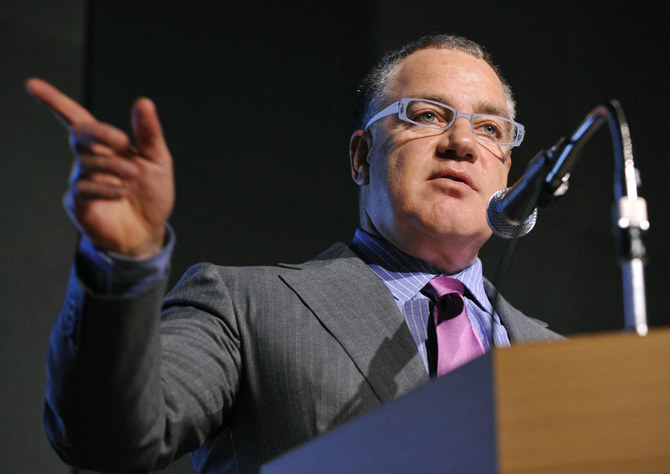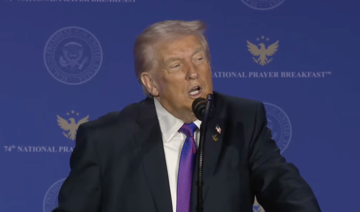LONDON: An Israeli billionaire has left the executive board of Harvard’s Kennedy School in protest at the “shocking and insensitive” official response to a student letter that held Israel accountable for last week’s Hamas attack.
Idan Ofer, a shipping and chemicals businessman, and his wife Batia said they were quitting their roles at Harvard following the row.
A group of 33 student organizations at Harvard, led by the Harvard Undergraduate Palestine Solidarity Committee, released a statement last Saturday holding Israel’s “apartheid regime” responsible for causing the latest outbreak of violence.
The statement said: “Today’s events did not occur in a vacuum. For the last two decades, millions of Palestinians in Gaza have been forced to live in an open-air prison. The apartheid regime is the only one to blame.”
The university’s response to the statement was criticized by 160 Harvard faculty members, who claimed that the student organizations “can be seen as nothing less than condoning the mass murder of civilians based only on their nationality.”
Harvard President Claudine Gay was accused by the Harvard Hillel Jewish center of contributing to “further hatred and antisemitism” by allegedly refusing to explicitly condemn Hamas in a response to the student group statement.
Harvard authorities said on Monday: “We write to you today heartbroken by the death and destruction unleashed by the attack by Hamas that targeted citizens in Israel this weekend, and by the war in Israel and Gaza now underway.”
A day letter, following criticism from former university President Lawrence Summers and former Harvard Medical School dean Jeffrey Flier, Gay said: “As the events of recent days continue to reverberate, let there be no doubt that I condemn the terrorist atrocities perpetrated by Hamas.
“Such inhumanity is abhorrent, whatever one’s individual views of the origins of longstanding conflicts in the region.
“Let me also state, on this matter as on others, that while our students have the right to speak for themselves, no student group — not even 30 student groups — speaks for Harvard University or its leadership.”
Hedge fund CEO Bill Ackman called for the names of the student signatories to be released to the public so that companies could avoid hiring them.
Sanaa Kahloon of the Harvard Undergraduate Palestine Solidarity Committee said the student group’s message had been misinterpreted.
“To restate what should be obvious: The PSC staunchly opposes violence against civilians — Palestinian, Israeli, or other,” she added.
Committee members have been sent death threats in the wake of the row, with the group calling off a planned vigil to mourn deaths in Israel and Gaza over safety fears.
Israeli billionaire quits Harvard executive board over Hamas support row
https://arab.news/bkey4
Israeli billionaire quits Harvard executive board over Hamas support row

- 33 student organizations blamed Israeli ‘apartheid regime’ for violence, saying ‘events did not occur in a vacuum’
- Idan Ofer calls official response to student letter ‘shocking and insensitive’
US condemns RSF drone attack on World Food Programme convoy in Sudan’s North Kordofan

- Denise Brown, the UN Humanitarian Coordinator for Sudan, also expresses concern over the drone attack
WASHINGTON: The US has condemned a drone attack by Rapid Support Forces on an aid convoy in Sudan’s North Kordofan state that killed one person and injured three others.
“The United States condemns the recent drone attack on a World Food Program convoy in North Kordofan transporting food to famine-stricken people which killed one and wounded many others,” US Senior Adviser for Arab and African Affairs Massad Boulos wrote on X.
“Destroying food intended for people in need and killing humanitarian workers is sickening,” the US envoy wrote.
“The Trump Administration has zero tolerance for this destruction of life and of U.S.-funded assistance; we demand accountability and extend our condolences to all those affected by these inexcusable events and terrible war,” he added.
The Sudan Doctors Network said the convoy was struck by RSF drones in the Allah Karim area as it headed toward displaced people in El-Obeid, the state capital, Anadolu Agency reported.
The network described the attack as a “clear violation of international humanitarian law,” warning that it undermines efforts to deliver life-saving aid to civilians amid worsening humanitarian conditions across the country.
There was no immediate comment from the rebel group.
The United States condemns the recent drone attack on a World Food Program convoy in North Kordofan transporting food to famine-stricken people which killed one and wounded many others. This follows an attack earlier this week in Blue Nile state that injured a @WFP staff member.…
— U.S. Senior Advisor for Arab and African Affairs (@US_SrAdvisorAF) February 6, 2026
Denise Brown, the UN Humanitarian Coordinator for Sudan, in a statement also expressed concern over the drone attack which hit the aid trucks in North Kordofan.
“I am deeply concerned by a drone attack earlier today on trucks contracted by the World Food Programme (WFP) in North Kordofan, the aftermath of which I came across a few hours later, as I left the state capital, El Obeid.”
“The trucks were en route from Kosti to deliver life-saving food assistance to displaced families near El Obeid when they were struck, tragically killing at least one individual and injuring many more. The trucks caught fire, destroying food commodities intended for life-saving humanitarian response.”
Brown added that “Humanitarian personnel, assets and supplies must be protected at all times. Attacks on aid operations undermine efforts to reach people facing hunger and displacement.”
“Safe and unimpeded humanitarian access remains critical to ensure assistance reaches the most vulnerable people across Sudan.”
Since April 2023, the conflict between Sudan’s army and the paramilitary forces has killed tens of thousands, displaced 11 million and which the UN has described as one of the world’s worst humanitarian crises.
An alert issued by the Integrated Food Security Phase Classification (IPC), confirmed famine conditions in El-Fasher and Kadugli, the capital of South Kordofan, about 800 kilometers to the east.
The IPC said that 20 more areas in Sudan’s Darfur and neighboring Kordofan were at risk of famine.
Of Sudan’s 18 states, the RSF controls all five states in the western Darfur region, except for parts of North Darfur that remain under army control. The army holds most areas of the remaining 13 states across the south, north, east and center of the country, including the capital, Khartoum.
The conflict between the army and the RSF, which erupted in April 2023, has killed thousands of people and displaced millions.














